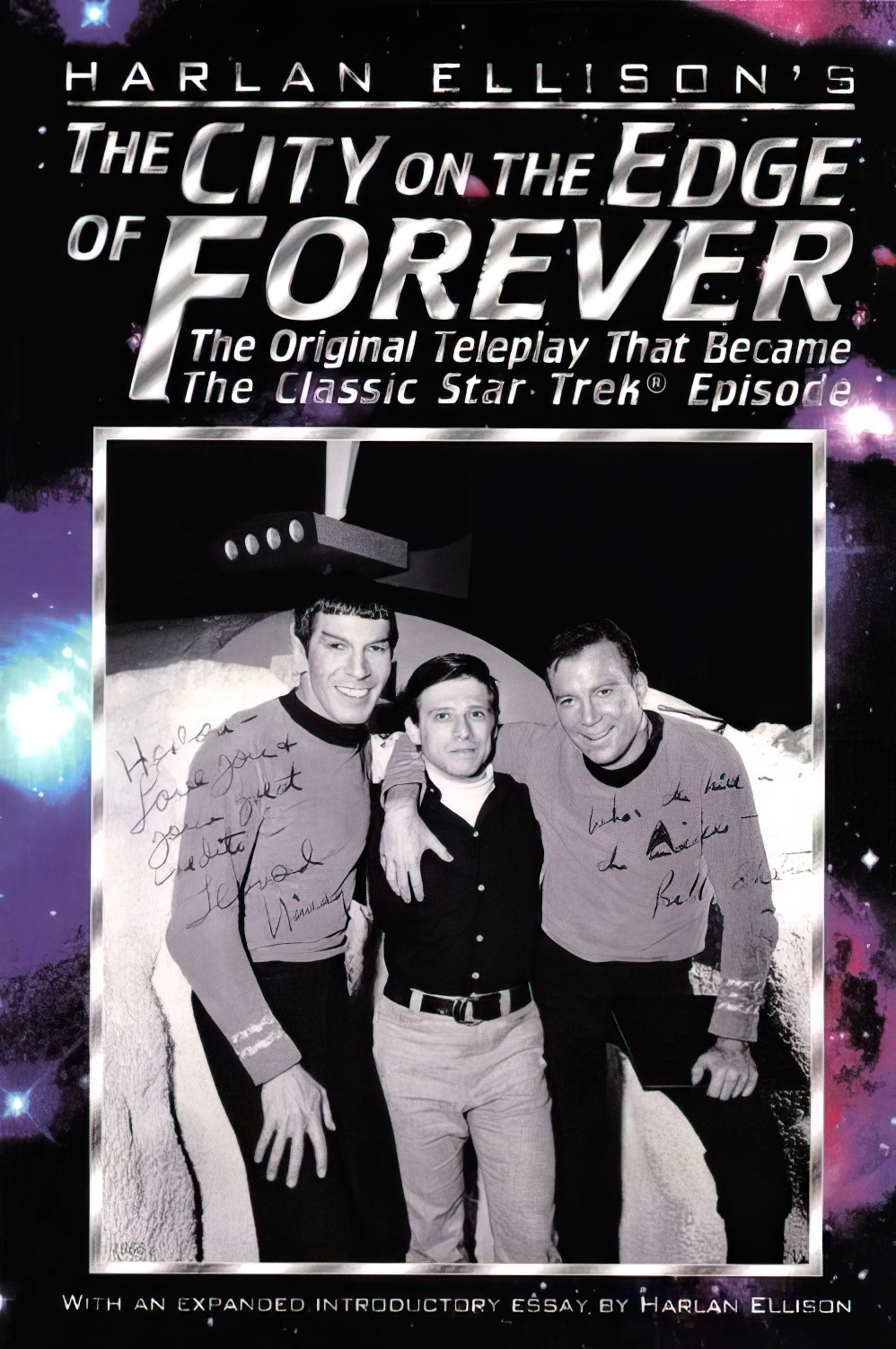 Story: Harlan Ellison’s complete original script, with revised drafts, for the legendary Star Trek episode is presented in its entirety, along with lengthy essays by Harlan on the story’s creation and the rewriting of its already storied history by various other parties, including Star Trek creator Gene Roddenberry.
Story: Harlan Ellison’s complete original script, with revised drafts, for the legendary Star Trek episode is presented in its entirety, along with lengthy essays by Harlan on the story’s creation and the rewriting of its already storied history by various other parties, including Star Trek creator Gene Roddenberry.
Review: This volume reprints the original draft, and several subsequent revisions, of Harlan Ellison’s multiple-award-winning, career-defining, critically acclaimed, and seemingly life-ruining Star Trek script, The City On The Edge Of Forever. A lengthy essay opens the book with the full background of the episode’s birth from Harlan’s own inimitable point of view. Numerous people have taken credit for City‘s success over the years, and just as many have been more than happy to lay the blame for any perceived faults in the story at Harlan’s feet. In this book, Harlan lashes out at all of them. Every last one of them. In a way, maybe “lashes out” is too gentle – he positively breathes fire at many of his former colleagues.
Chief among Harlan’s rogues’ gallery of people who defaced his work is the late Gene Roddenberry, and no secret is made of this fact. Gene was instrumental in the mythologizing of the supposed troubles with Harlan’s script, after all, and all things being fair, Harlan takes more than his allotted shot back at Star Trek’s creator, also taking shots at virtually everyone else involved in the show. It is nice to see him firing off a salvo in William Shatner’s direction, though – I never quite fell for Shatner’s self-important declarations that he had personally saved Star Trek umpteen gazillion times, and Harlan’s response to the erstwhile skipper’s biographical blitherings is a moment of pure glee.
The script itself is a formidable piece of fiction, worth every award it has earned. Considering the self-preserving-at-all-costs entity that Star Trek has mutated into in the past few years, it’s not hard to see why Roddenberry balked at the original script. The original script is not bad – it’s a thing of beauty. But it would have required a more sensitive and carefully-plotted portrayal of Kirk than we saw in Star Trek’s TV days – and certainly would have added a different dimension to, if it didn’t eliminate altogether, Kirk’s bed-hopping tendencies. The actors probably would have been able to play the material – but in the end, this is not the material they were given. The original description of the Guardians of Forever (not the stone structure seen in the final product) as ancient, monolithic constructs of living stone almost begs a comparison to Vorlons. The original script for City would have worked beautifully on Babylon 5 or Twilight Zone. It could have worked wonders for Star Trek as well.
There is a section of brief essays by other authors, including Leonard Nimoy, DeForest Kelley, David Gerrold, D.C. Fontana, Melinda Snodgrass, Walter Koenig and Peter David. Nimoy and Kelley seem to express sincere admiration for Harlan’s original script, but most of the other writers take the opportunity to stand in a circle and piss on the grave of Roddenberry for reasons that have little connection to Harlan’s gripe with Gene. I know that you have to let Gene become the “bad guy” while reading the book’s historical backgrounds, but some of the essays – particularly Snodgrass’ (who wrote some very good episodes of Next Generation) – are exercises in pure vitriol. I suppose they all know of what they speak, but in places the pissing contest runneth over.
The script is fascinating, but the more subjective portions of the book will likely be the subject of intense controversy for as long as Harlan himself graces the world with his wonderfully curmudgeonly presence – and afterward.
Year: 1997
Author: Harlan Ellison
Publisher: White Wolf
Pages: 278 pages
